13 Jul 2017 | News, Turkey
[vc_row][vc_column][vc_column_text]
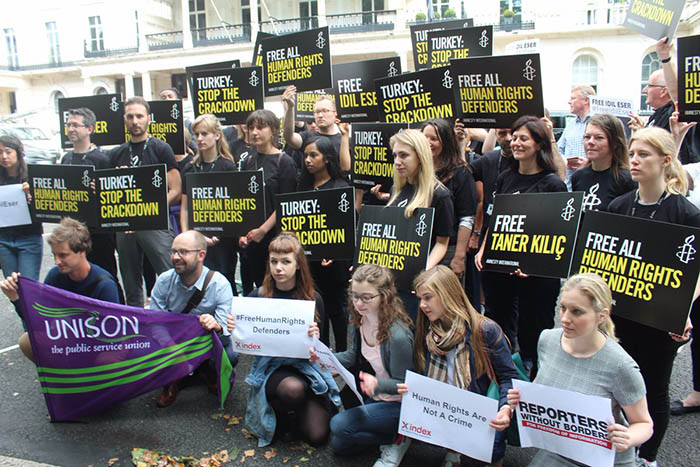
Credit: Cat Lucas, English Pen
Index on Censorship took part in a rally on 12 July at the Turkish Embassy in London to call for the release of Idil Eser, the director of Amnesty International Turkey.
Eser was detained along with seven human rights defenders and two non-Turkish trainers on 5 July while conducting a digital security and information management workshop in Büyükada, Istanbul. The protest marked the one week anniversary of their arrest.
In this special podcast, we asked representatives from Amnesty International UK, Reporters Without Borders, English Pen and Index on Censorship about the state of media freedom in Turkey and their messages for the detained human rights defenders.
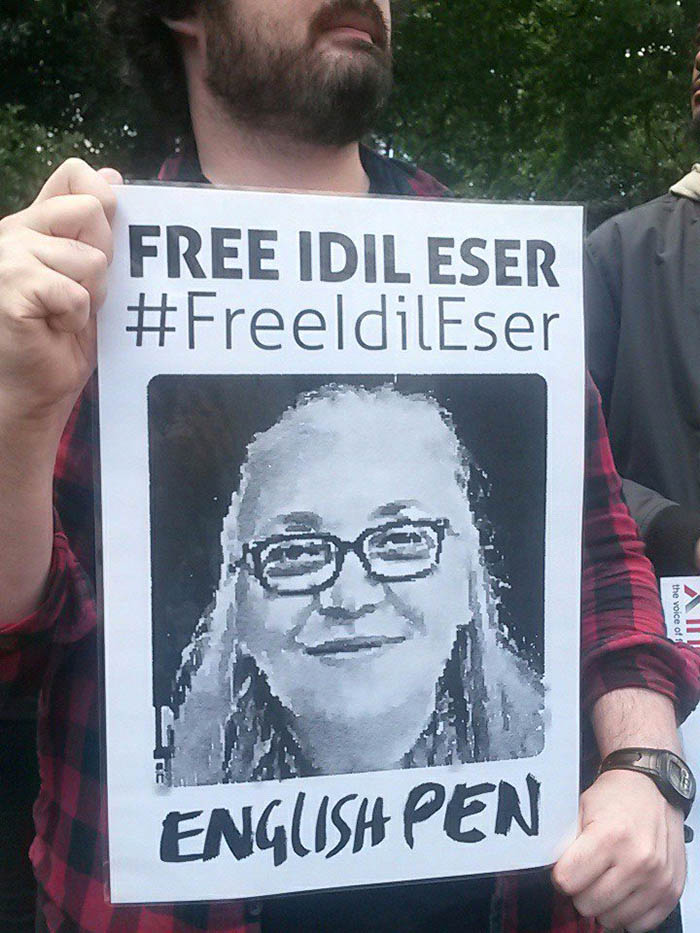
Credit: Cat Lucas, English Pen
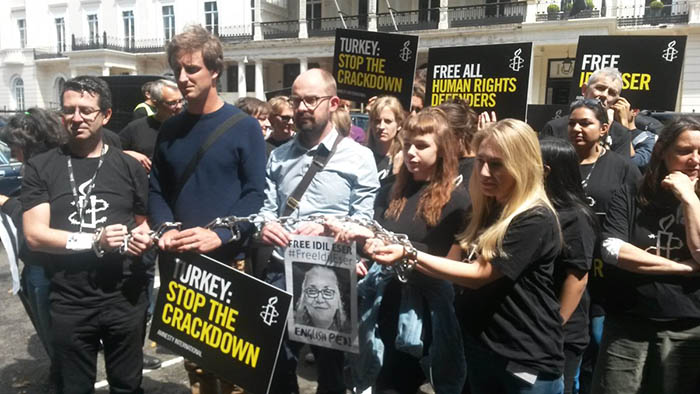
Credit: Cat Lucas, English Pen
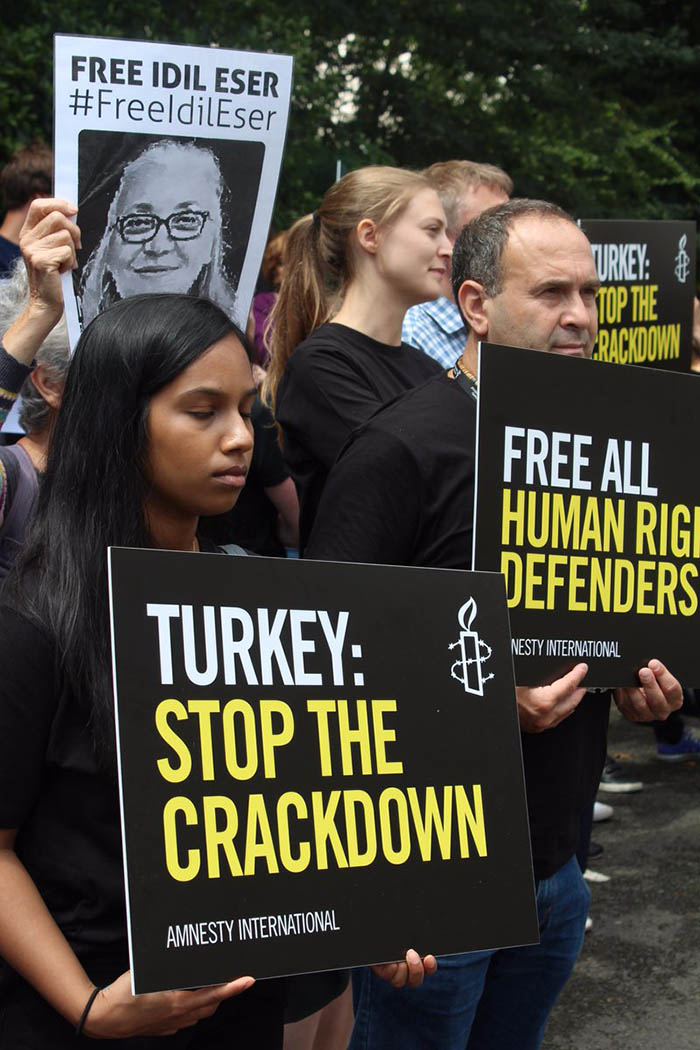
Credit: Cat Lucas, English Pen
[/vc_column_text][/vc_column][/vc_row][vc_row][vc_column][vc_basic_grid post_type=”post” max_items=”4″ element_width=”6″ grid_id=”vc_gid:1499960075571-a5ebc084-208c-2″ taxonomies=”55″][/vc_column][/vc_row]
6 Jul 2017 | Campaigns -- Featured, Europe and Central Asia, Statements, Turkey, Turkey Statements
[vc_row][vc_column][vc_column_text]
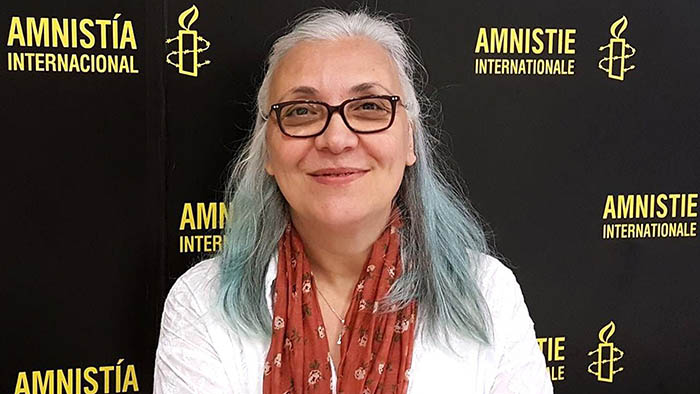
Idil Eser, director of Amnesty International Turkey
Index on Censorship condemns the arrest of Idil Eser, director of Amnesty International Turkey, and demands her immediate and unconditional release, along with that of two digital security trainers and seven human rights defenders. All were arrested during a digital security and information management workshop in Büyükada, Istanbul, on Wednesday afternoon.
“The detention of Idil Eser and other participants in yesterday’s workshop marks a new low in the rapidly decreasing status of human rights in Turkey,” said Melody Patry, head of advocacy at Index on Censorship. “By detaining them incommunicado and denying them access to a lawyer, Turkey shows its complete disregard for the rule of law.”
The whereabouts of Eser and the other detainees are currently unknown. Eser has allegedly been denied access to communication with her lawyer and her family — the latter of which is illegal under Turkish law.
These are just the latest in a string of attacks on civil society. Thousands of journalists and academics have lost their jobs since the coup attempt in July 2016. Turkey is now the world’s top jailer of journalists, with over 160 in jail. Many journalists, including brothers Ahmet Altan and Mehmet Altan, who have been charged with a variety of false and exaggerated claims, await their fate during a trial next month.
Last month, Taner Kiliç, chair of Amnesty International Turkey, and 22 lawyers were unlawfully detained and have yet to be released. In January, three academics who signed a peace petition were also imprisoned.
Take action
Tweet the following from your account:
Dear @RT_Erdogan. We demand the release of Amnesty Turkey Director Idil Eser and her colleagues now! #TurkeyRelease #G20 #TurkeyUncensored[/vc_column_text][/vc_column][/vc_row][vc_row][vc_column][vc_basic_grid post_type=”post” max_items=”4″ element_width=”6″ grid_id=”vc_gid:1499358790272-737dafa5-94ee-6″ taxonomies=”8607″][/vc_column][/vc_row]
27 Jun 2017 | Mapping Media Freedom, News, Turkey
[vc_row][vc_column][vc_column_text]

Brothers Ahmet Altan and Mehmet Altan. Credit: CEFTUS
Throughout June, Index on Censorship’s Mapping Media Freedom project has recorded a number of violations in Turkey, which is now the biggest jailer of journalists in the world.
Turkish journalists charged with sending “subliminal messages”
The first hearing of the ongoing trial of Turkish journalists for involvement in last year’s coup took place on Monday 19 June. Political commentators and brothers Ahmet Altan and Mehmet Altan are accused of offences against Turkish President Recep Tayyip Erdogan and the Turkish government including “attempting to overthrow the Government of Turkey” and using “subliminal messaging” to encourage the coup.
The Altan brothers have been in pretrial detention for 11 months. Ahmet is a well-known journalist in Turkey and has worked as a reporter and editor at several newspapers. He has previously been charged with “denigrating Turkishness” after writing about the Armenian genocide. Mehmet is a professor at Istanbul University who has called on Turkey to improve its human rights record.
The hearing was delayed, and the judge spent several hours reading a long summary of the indictment, according to Index’s head of advocacy Melody Patry, who formed part of an international delegation of observers to the trial.
In his defence statement, Ahmet called the indictment against him “untruthful and nonsensical”. He described the charges and refuted them, explaining his lack of connection to instigating the coup. “I take you through all these things in such detail because I want everyone to see the recklessness with which this prosecutor and his like have darkened people’s lives, how they have abused their power,” he said. “I want all this to be documented for the day the law wakes up.”
Ahmet quoted portions of the indictment against him, including an excerpt in which he questioned the case of Can Dundar, another Turkish journalist who was convicted of espionage for publishing evidence of Turkey sending arms to Syria. Ahmet maintains that Turkish people had a right to know about these events. “Perhaps the prosecutor is giving a not at all ‘subliminal’ message to Turkey that whoever defends the rule of law will be thrown in jail,” he said.
According to Patry, this case is significant because of the potential three life sentences the journalists face as the first instance of journalists prosecuted for being complicit in the coup.
On 1 June, Turkish police detained eight people for using the chat software ByLock, the software the authorities in Turkey suspect was used by the group that plotted the 15 July coup attempt.
Former regional bureau chief of the Cihan news agency, referred to only as KA in news reports, was among those arrested.
İlker Yücel, the editor-in-chief of Aydınlık newspaper, was taken into custody and arrested on 2 June. The arrest was related to a 2014 story in Aydınlık which was found insulting to Berat Albayrak, Turkey’s Energy Minister and the son-in-law of President Recep Tayyip Erdoğan. The newspaper failed to print a correction or pay a TL 100,000 fine,
He was released on 4 June.
A court received an indictment for two consecutive life sentences without the possibility of parole for 13 journalists on 6 June. The charge from Istanbul’s Chief Prosecutor lists Gökçe Fırat Çulhaoğlu, Yakup Çetin, Bünyamin Köseli, Cihan Acar, Abdullah Kılıç, Oğuz Usluer, Atilla Taş, Hüseyin Aydın, Murat Aksoy, Mustafa Erkan, Seyit Kılıç, Yetkin Yıldız and Ali Akkuş as suspects.
The 13 journalists are charged with “attempting to overthrow the constitutional order” and “attempting to overthrow the government of the Republic of Turkey,” in connection with the 15 July coup attempt. They previously stood trial for “membership of a terrorist organisation” but were released 31 March. All but one of them were rearrested on the new charges.
The managing editor of the newspaper Evrensel, Çağrı Sarı, and former copyrights owner of the newspaper Arif Koşar each received five-month prison sentences on 6 June. They were convicted of “Denigrating the Turkish Nation, the State of the Republic of Turkey, the Agencies and Institutions of the State.” The charges were regarding a story published in Evrensel on Nusaybin.[/vc_column_text][/vc_column][/vc_row][vc_row][vc_column][vc_column_text]
Mapping Media Freedom
Click on the bubbles to view reports or double-click to zoom in on specific regions. The full site can be accessed at https://mappingmediafreedom.org/[/vc_column_text][/vc_column][/vc_row][vc_row][vc_column][vc_single_image image=”91878″][/vc_column][/vc_row]
19 Jun 2017 | News, Turkey
[vc_row][vc_column][vc_column_text]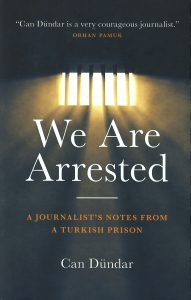 The Royal Shakespeare Company performed an abridged version of Turkish journalist Can Dündar’s book We Are Arrested on stage at the Other Place in Stratford-upon-Avon on Friday 16 June. The plot follows Dündar’s arrest and imprisonment after his decision as editor-in-chief of Cumhuriyet newspaper to publish evidence of Turkish intelligence services sending weapons to Syria.
The Royal Shakespeare Company performed an abridged version of Turkish journalist Can Dündar’s book We Are Arrested on stage at the Other Place in Stratford-upon-Avon on Friday 16 June. The plot follows Dündar’s arrest and imprisonment after his decision as editor-in-chief of Cumhuriyet newspaper to publish evidence of Turkish intelligence services sending weapons to Syria.
Cumhuriyet received the Reporters without Borders (RSF) Press Freedom Prize in 2015 for its reporting despite being the target of “frequent persecution by the Turkish regime”.
The performance featured two actors, with the audience seated in a square formation surrounding the performers. The actors used two chairs as props. One actor played Dündar and narrated the plot, while the second actor played the other characters who interacted with him, including his son, his wife and fellow Cumhuriyet journalist and prisoner Erdem Gül.
In November 2015, Dündar and Gül were charged with espionage for exposing secret information. In the play, his character described the decision to publish the evidence that landed him in jail, which was printed under the headline: The weapons denied by Erdogan. Several times throughout the reading, Dündar’s character reiterated the guiding principles that led him to print: Is the work genuine? Is it in the public interest? If it is more valuable to publish the work than to “put it in a drawer,” then it is a journalist’s civic duty to publish.
While waiting to hear the charges against him, Dündar drew on George Orwell for moral support, quoting: “During times of universal deceit, telling the truth becomes a revolutionary act.”
In February 2016, the Turkish Supreme Court declared Dündar’s imprisonment unlawful and ordered his release. He described his release as moving from “the closed prison of Silivri to the semi-open prison that is Turkey”.
Since then, Dündar has lived in exile in Berlin. His wife, Dilek Dündar, is unable to leave Turkey, where she has lived “like a hostage” ever since her passport was confiscated. Most of the characters in the play are now in jail, including three of Dündar’s lawyers and a dozen Cumhuriyet journalists have been arrested. Press freedom in Turkey has been on the decline, falling from 98th in the world in 2005 to 155th in 2017 according to RSF’s World Press Freedom Index.
Dündar spoke to Index following the play about those journalists and defenders of freedom of expression still imprisoned in Turkey. “We have to defend their job and their freedoms and we have to be brave,” he said. “Being talented is not enough – you have to be brave at the same time. We will prevail in the end.”[/vc_column_text][/vc_column][/vc_row][vc_row][vc_column][vc_basic_grid post_type=”post” max_items=”4″ element_width=”6″ grid_id=”vc_gid:1497951623613-7ff5d7eb-a81e-2″ taxonomies=”7789″][/vc_column][/vc_row][vc_row full_width=”stretch_row_content_no_spaces” content_placement=”middle”][vc_column][vc_single_image image=”91122″ img_size=”full” alignment=”center” onclick=”custom_link” link=”https://www.indexoncensorship.org/2017/05/stand-up-for-satire/”][/vc_column][/vc_row]







 The Royal Shakespeare Company performed an abridged version of Turkish journalist Can D
The Royal Shakespeare Company performed an abridged version of Turkish journalist Can D